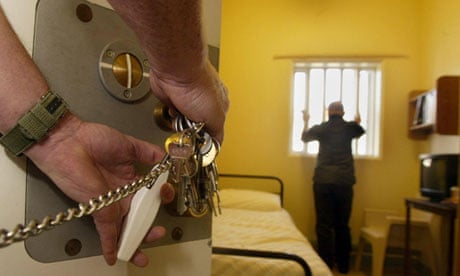Prison service funding cuts have led to a rising number of assaults and escapes and further staff reductions could put the government's "rehabilitation revolution" at risk, a cross-party group of MPs has warned.
The influential Commons public accounts committee, chaired by the former Labour minister Margaret Hodge, says in a report that the national offender management service (NOMS), which runs prisons and probation, did well to hit its savings target of £230m in 2011-12 but now faces serious problems in finding a further £653m of savings by 2014-15.
The report says the strategy of the justice secretary, Chris Grayling, of closing older, more expensive prisons and opening newer, cheaper jails is based on the assumption that prison overcrowding will not be able to be reduced. The existing prison population of 84,431 in England and Wales is already at the maximum level prison chiefs regard as safe.
The MPs say that before closing prisons, NOMS needs to evaluate the impact of doing so on overcrowding, the ability to deliver individual sentence plans and the capacity to match prisoners to work programmes.
"Its strategy depends on the prison population remaining stable, something over which it has no control," Hodge said. "It also depends on making significant numbers of staff redundant, but the agency doesn't yet have the resources to fund the redundancy payments required."
She said there was a risk that reduced numbers will result in staff being taken off offender management programmes to cover duty on prison wings. "This means that training and rehabilitation activities could suffer, even though we know these reduce re-offending after release. The agency needs to seriously consider the long-term consequences of short-term cuts."
The report says that last year's round of spending cuts had already increased the level of risk in some prisons. "We are concerned about safety and decency in some prisons and the fact that more prisoners are reporting that they do not feel safe. Assaults on staff, self-harm and escapes from contractor escorts have all increased. The agency should ensure that savings plans have regard to the potential impact on risks to standards of safety, decency and respect in prisons and in the community."
The publication of the report follows an attack by Grayling accusing Hodge of "political grandstanding" and failing to take a "proper and dispassionate view of her job" after the committee described the performance of the work programme as "extremely poor". Grayling introduced the programme during his time as minister for work and pensions before becoming justice secretary.
The report does, however, recognise that local probation trusts do not have the infrastructure and skills to commission probation services from the private and voluntary sector. Justice ministers have already decided that because of this lack of expertise, the NOMS should oversee the outsourcing of probation contracts, which is to be done on a payment by results basis.
At a Policy Exchange conference in London on Monday, Grayling renewed his attack on Hodge, claiming she was playing politics by attacking payment by results whenever she could.
"She's wasted no time in bashing and misrepresenting the credentials of work programme. But the reality is that under the last government she served as employment minister, and millions and millions of taxpayers' money was handed to private companies without any significant measure of success or transparency," he said.
"It's madness for her to now claim that payment by results – a clear mechanism whereby providers put their own money at risk before they can demonstrate an agreed measure of success – delivers a worse performance than the black hole Labour presided over before."




